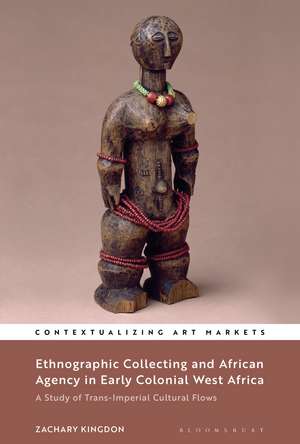Ethnographic Collecting and African Agency in Early Colonial West Africa: A Study of Trans-Imperial Cultural Flows: Contextualizing Art Markets
Autor Dr Zachary Kingdonen Limba Engleză Paperback – 2 iun 2021
| Toate formatele și edițiile | Preț | Express |
|---|---|---|
| Paperback (1) | 185.24 lei 3-5 săpt. | |
| Bloomsbury Publishing – 2 iun 2021 | 185.24 lei 3-5 săpt. | |
| Hardback (1) | 780.73 lei 6-8 săpt. | |
| Bloomsbury Publishing – 20 feb 2019 | 780.73 lei 6-8 săpt. |
Preț: 185.24 lei
Preț vechi: 211.56 lei
-12% Nou
Puncte Express: 278
Preț estimativ în valută:
35.45€ • 36.96$ • 29.46£
35.45€ • 36.96$ • 29.46£
Carte disponibilă
Livrare economică 27 februarie-13 martie
Preluare comenzi: 021 569.72.76
Specificații
ISBN-13: 9781501377884
ISBN-10: 1501377884
Pagini: 336
Ilustrații: 34 colour and 90 bw illus
Dimensiuni: 152 x 229 x 21 mm
Greutate: 0.68 kg
Editura: Bloomsbury Publishing
Colecția Bloomsbury Visual Arts
Seria Contextualizing Art Markets
Locul publicării:New York, United States
ISBN-10: 1501377884
Pagini: 336
Ilustrații: 34 colour and 90 bw illus
Dimensiuni: 152 x 229 x 21 mm
Greutate: 0.68 kg
Editura: Bloomsbury Publishing
Colecția Bloomsbury Visual Arts
Seria Contextualizing Art Markets
Locul publicării:New York, United States
Caracteristici
First major study that explores the agency and agendas of Africans who contributed to museum ethnography collections in Britain
Notă biografică
Zachary Kingdon is Curator of African Collections at National Museums Liverpool, UK.
Cuprins
List of IllustrationsList of Colour PlatesAcknowledgements1. IntroductionApproachStructure and Outline2. Prologue: Western Africa, Africans, and Liverpool's Municipal MuseumAfter the Slave TradeThe Niger ExpeditionJoseph Mayer and the Inauguration of Liverpool's Ethnography CollectionBetween Empire and Trade Conclusion3. Arnold Ridyard and his Assemblage Ridyard's Family Background and Methodist IdentityMaritime Career, Collecting Practices and Social NetworksAcquisition and Generosity Ridyard's Dissenting InterestsConclusion4. Diasporic Dialogues: The Sierra Leonean Donors I W. R. Renner, West African CapitalistKrio Diaspora: Collecting and Culture in the Early Twentieth CenturyWomen Donors: Mrs W. E. Johnson and Miss B Yorke The Muslim Donors: Colonial Exclusion, African Regional Trajectories Conclusion5. Trans-Imperial Identities: The Sierra Leonean Donors II Freetown, Architecture, and Krio Self-OrientationKrio Male Elites'Upbuilding' and EmpireClaudius D. Hotobah DuringConclusion6. Coastal 'Kings': The Gold Coast Donors I Ababio IV, Amonu V, Acquah II, and Prince TackieKojo Ababio IV, Accra Political PlayerPotters of Accra's Western PlainsAmbiguous 'Traditionalist': E. W. Quartey-PapafioDr. Edward Mettle, 'Man of Mystery and Power'Conclusion7. Coastal Cosmopolitans: The Gold Coast Donors IIFrederick Lutterodt, West African PhotographerArthur Robert Chinery, Euro-Ga Professional John Mensah Sarbah, 'Cosmopolitan Patriot'J. P. Brown, C. J. Bannerman and other 'Cosmopolitan Patriots'Mobile Elites: C. J. Reindorf, H. Van Hien and othersConclusion8. Museum Meanings: Regimes of Classification, Representation and Display Exhibiting OrderRe-arranging and Re-evaluating the Liverpool Museum African Collection in the 1930s Erosion and Occlusion: The Ridyard Assemblage at the Liverpool Museum, 1905 to 1968ConclusionEpilogueReferencesIndex
Recenzii
Kingdon's timely efforts help to challenge our understanding of UK museums and their histories. Close archival reading and attention to complex socio-economic context illuminates the material and intellectual contributions of a fascinating group of West African individuals. This is essential reading for scholars of museums and collections, of West Africa and beyond.
With impressive command of highly original and hitherto unused sources, Kingdon breaks with the culturalist essentialisations that reduce African history to a tale of unnamed powerless 'Africans' dominated by European imperialists. While never losing sight of how power inequalities influenced interactions and negotiations, Kingdon's book is a history of named individuals whose characters and strategies are reconstructed in their full complexity and, at times, ambiguity. Lucidly written and engaging, this book is not only a major contribution to historical knowledge, but also an absolute pleasure to read.
With impressive command of highly original and hitherto unused sources, Kingdon breaks with the culturalist essentialisations that reduce African history to a tale of unnamed powerless 'Africans' dominated by European imperialists. While never losing sight of how power inequalities influenced interactions and negotiations, Kingdon's book is a history of named individuals whose characters and strategies are reconstructed in their full complexity and, at times, ambiguity. Lucidly written and engaging, this book is not only a major contribution to historical knowledge, but also an absolute pleasure to read.













